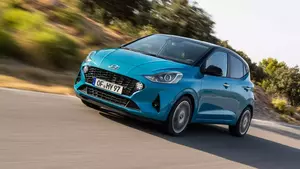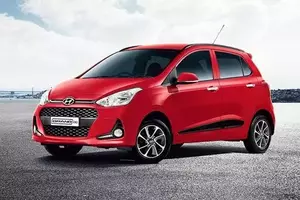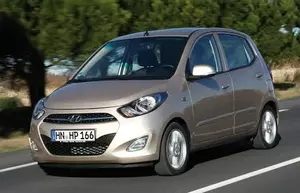


| Engine | 0—60 mph | 0—100 km/h | Top Speed | Averange Economy |
|---|---|---|---|---|
| 1.0 MPi | 16.4 s | 17.3 s | 97 mph | 44 mpg |
| 1.2 MPi | 12 s | 12.6 s | 106 mph | 44 mpg |
| Engine | 1.0 MPi |
|---|---|
| 0—60 mph | 16.4 s |
| 0—100 km/h | 17.3 s |
| Top Speed | 97 mph |
| Averange Economy | 44 mpg |
| Engine | 1.2 MPi |
| 0—60 mph | 12 s |
| 0—100 km/h | 12.6 s |
| Top Speed | 106 mph |
| Averange Economy | 44 mpg |
In 2019, Hyundai i10 0-60 acceleration was between 12 and 16.4 seconds.
Hyundai i10 0-60 mph was up to 72% slower in 2019 than world's average.
| Vehicle | Acceleration 0—60 mph (0—100 km/h) | Maximum speed | Acceleration to passenger ratio | Fuel consumption at high speed | Fuel type / gearbox |
|---|---|---|---|---|---|
| 1.0 MPi | 16.4 s to 60 mph (17.3 s to 100 km/h) | 97 mph (156 km/h) | 3.3 s to 60 mph / person | - | Petrol (Gasoline) / 5 |
| 1.2 MPi | 12 s to 60 mph (12.6 s to 100 km/h) | 106 mph (171 km/h) | 3 s to 60 mph / person | - | Petrol (Gasoline) |
| Vehicle | 1.0 MPi |
|---|---|
| Acceleration 0-60 mph (0-100 km/h) | 16.4 s to 60 mph (17.3 s to 100 km/h) |
| Maximum speed | 97 mph (156 km/h) |
| Acceleration to passenger ratio | 3.3 s to 60 mph / person |
| Fuel consumption at high speed | - |
| Fuel type / gearbox | Petrol (Gasoline) / 5 |
| Vehicle | 1.2 MPi |
| Acceleration 0-60 mph (0-100 km/h) | 12 s to 60 mph (12.6 s to 100 km/h) |
| Maximum speed | 106 mph (171 km/h) |
| Acceleration to passenger ratio | 3 s to 60 mph / person |
| Fuel consumption at high speed | - |
| Fuel type / gearbox | Petrol (Gasoline) |

| Engine | 0—60 mph | 0—100 km/h | Top Speed | Averange Economy |
|---|---|---|---|---|
| 1.0 | 14.2 s | 14.9 s | 97 mph | 46 mpg |
| 1.0 LPG | 14.4 s | 15.2 s | 95 mph | 46 mpg |
| blue 1.0 | 14.2 s | 14.9 s | 97 mph | 48 mpg |
| 1.2 | 11.7 s | 12.3 s | 109 mph | 43 mpg |
| Engine | 1.0 |
|---|---|
| 0—60 mph | 14.2 s |
| 0—100 km/h | 14.9 s |
| Top Speed | 97 mph |
| Averange Economy | 46 mpg |
| Engine | 1.0 LPG |
| 0—60 mph | 14.4 s |
| 0—100 km/h | 15.2 s |
| Top Speed | 95 mph |
| Averange Economy | 46 mpg |
| Engine | blue 1.0 |
| 0—60 mph | 14.2 s |
| 0—100 km/h | 14.9 s |
| Top Speed | 97 mph |
| Averange Economy | 48 mpg |
| Engine | 1.2 |
| 0—60 mph | 11.7 s |
| 0—100 km/h | 12.3 s |
| Top Speed | 109 mph |
| Averange Economy | 43 mpg |
In 2016, Hyundai i10 0-60 acceleration was between 11.7 and 14.4 seconds.
Hyundai i10 0-60 mph was up to 51% slower in 2016 than world's average.
In 2016, Hyundai i10 0-60 mph to car weight ratio is shown below:
| Vehicle | Acceleration 0—60 mph (0—100 km/h) | Maximum speed | Acceleration to passenger ratio | Fuel consumption at high speed | Fuel type / gearbox |
|---|---|---|---|---|---|
| 1.0 | 14.2 s to 60 mph (14.9 s to 100 km/h) | 97 mph (156 km/h) | 2.8 s to 60 mph / person | 53 mpg (4.4 L per 100 km) | Petrol (Gasoline) |
| 1.0 LPG | 14.4 s to 60 mph (15.2 s to 100 km/h) | 95 mph (153 km/h) | 2.9 s to 60 mph / person | 56 mpg (4.2 L per 100 km) | Petrol / LPG |
| blue 1.0 | 14.2 s to 60 mph (14.9 s to 100 km/h) | 97 mph (156 km/h) | 2.8 s to 60 mph / person | 55 mpg (4.3 L per 100 km) | Petrol (Gasoline) |
| 1.2 | 11.7 s to 60 mph (12.3 s to 100 km/h) | 109 mph (175 km/h) | 2.3 s to 60 mph / person | 52 mpg (4.5 L per 100 km) | Petrol (Gasoline) |
| Vehicle | 1.0 |
|---|---|
| Acceleration 0-60 mph (0-100 km/h) | 14.2 s to 60 mph (14.9 s to 100 km/h) |
| Maximum speed | 97 mph (156 km/h) |
| Acceleration to passenger ratio | 2.8 s to 60 mph / person |
| Fuel consumption at high speed | 53 mpg (4.4 L per 100 km) |
| Fuel type / gearbox | Petrol (Gasoline) |
| Vehicle | 1.0 LPG |
| Acceleration 0-60 mph (0-100 km/h) | 14.4 s to 60 mph (15.2 s to 100 km/h) |
| Maximum speed | 95 mph (153 km/h) |
| Acceleration to passenger ratio | 2.9 s to 60 mph / person |
| Fuel consumption at high speed | 56 mpg (4.2 L per 100 km) |
| Fuel type / gearbox | Petrol / LPG |
| Vehicle | blue 1.0 |
| Acceleration 0-60 mph (0-100 km/h) | 14.2 s to 60 mph (14.9 s to 100 km/h) |
| Maximum speed | 97 mph (156 km/h) |
| Acceleration to passenger ratio | 2.8 s to 60 mph / person |
| Fuel consumption at high speed | 55 mpg (4.3 L per 100 km) |
| Fuel type / gearbox | Petrol (Gasoline) |
| Vehicle | 1.2 |
| Acceleration 0-60 mph (0-100 km/h) | 11.7 s to 60 mph (12.3 s to 100 km/h) |
| Maximum speed | 109 mph (175 km/h) |
| Acceleration to passenger ratio | 2.3 s to 60 mph / person |
| Fuel consumption at high speed | 52 mpg (4.5 L per 100 km) |
| Fuel type / gearbox | Petrol (Gasoline) |

| Engine | 0—60 mph | 0—100 km/h | Top Speed | Averange Economy |
|---|---|---|---|---|
| 1.2 | 14.6 s | 15.4 s | 98 mph | - |
| 1.1 CRDi | 14.8 s | 15.6 s | 98 mph | - |
| Engine | 1.2 |
|---|---|
| 0—60 mph | 14.6 s |
| 0—100 km/h | 15.4 s |
| Top Speed | 98 mph |
| Averange Economy | - |
| Engine | 1.1 CRDi |
| 0—60 mph | 14.8 s |
| 0—100 km/h | 15.6 s |
| Top Speed | 98 mph |
| Averange Economy | - |
In 2013, Hyundai i10 0-60 acceleration was between 14.6 and 14.8 seconds.
Hyundai i10 0-60 mph was up to 55% slower in 2013 than world's average.
In 2013, Hyundai i10 0-60 mph to car weight ratio is shown below:
| Vehicle | Acceleration 0—60 mph (0—100 km/h) | Maximum speed | Acceleration to passenger ratio | Fuel consumption at high speed | Fuel type / gearbox |
|---|---|---|---|---|---|
| 1.2 | 14.6 s to 60 mph (15.4 s to 100 km/h) | 98 mph (157 km/h) | 2.9 s to 60 mph / person | - | Petrol (Gasoline) / 4 |
| 1.1 CRDi | 14.8 s to 60 mph (15.6 s to 100 km/h) | 98 mph (157 km/h) | 3 s to 60 mph / person | - | Diesel |
| Vehicle | 1.2 |
|---|---|
| Acceleration 0-60 mph (0-100 km/h) | 14.6 s to 60 mph (15.4 s to 100 km/h) |
| Maximum speed | 98 mph (157 km/h) |
| Acceleration to passenger ratio | 2.9 s to 60 mph / person |
| Fuel consumption at high speed | - |
| Fuel type / gearbox | Petrol (Gasoline) / 4 |
| Vehicle | 1.1 CRDi |
| Acceleration 0-60 mph (0-100 km/h) | 14.8 s to 60 mph (15.6 s to 100 km/h) |
| Maximum speed | 98 mph (157 km/h) |
| Acceleration to passenger ratio | 3 s to 60 mph / person |
| Fuel consumption at high speed | - |
| Fuel type / gearbox | Diesel |

| Engine | 0—60 mph | 0—100 km/h | Top Speed | Averange Economy |
|---|---|---|---|---|
| 1.25 16V | 11.7 s | 12.3 s | 106 mph | 48 mpg |
| 1.0 16V | 14.4 s | 15.2 s | 95 mph | 55 mpg |
| Engine | 1.25 16V |
|---|---|
| 0—60 mph | 11.7 s |
| 0—100 km/h | 12.3 s |
| Top Speed | 106 mph |
| Averange Economy | 48 mpg |
| Engine | 1.0 16V |
| 0—60 mph | 14.4 s |
| 0—100 km/h | 15.2 s |
| Top Speed | 95 mph |
| Averange Economy | 55 mpg |
In 2013, Hyundai i10 0-60 acceleration was between 11.7 and 14.4 seconds.
Hyundai i10 0-60 mph was up to 51% slower in 2013 than world's average.
In 2013, Hyundai i10 0-60 mph to car weight ratio is shown below:
| Vehicle | Acceleration 0—60 mph (0—100 km/h) | Maximum speed | Acceleration to passenger ratio | Fuel consumption at high speed | Fuel type / gearbox |
|---|---|---|---|---|---|
| 1.25 16V | 11.7 s to 60 mph (12.3 s to 100 km/h) | 106 mph (171 km/h) | 2.3 s to 60 mph / person | 57 mpg (4.1 L per 100 km) | Petrol (Gasoline) |
| 1.0 16V | 14.4 s to 60 mph (15.2 s to 100 km/h) | 95 mph (153 km/h) | 2.9 s to 60 mph / person | 64 mpg (3.7 L per 100 km) | Petrol / LPG |
| Vehicle | 1.25 16V |
|---|---|
| Acceleration 0-60 mph (0-100 km/h) | 11.7 s to 60 mph (12.3 s to 100 km/h) |
| Maximum speed | 106 mph (171 km/h) |
| Acceleration to passenger ratio | 2.3 s to 60 mph / person |
| Fuel consumption at high speed | 57 mpg (4.1 L per 100 km) |
| Fuel type / gearbox | Petrol (Gasoline) |
| Vehicle | 1.0 16V |
| Acceleration 0-60 mph (0-100 km/h) | 14.4 s to 60 mph (15.2 s to 100 km/h) |
| Maximum speed | 95 mph (153 km/h) |
| Acceleration to passenger ratio | 2.9 s to 60 mph / person |
| Fuel consumption at high speed | 64 mpg (3.7 L per 100 km) |
| Fuel type / gearbox | Petrol / LPG |

| Engine | 0—60 mph | 0—100 km/h | Top Speed | Averange Economy |
|---|---|---|---|---|
| 1.1 | 16.2 s | 17.1 s | 93 mph | 41 mpg |
| 1.2 | 13.1 s | 13.8 s | 99 mph | 43 mpg |
| 1.0 | 14.1 s | 14.8 s | 93 mph | 56 mpg |
| Engine | 1.1 |
|---|---|
| 0—60 mph | 16.2 s |
| 0—100 km/h | 17.1 s |
| Top Speed | 93 mph |
| Averange Economy | 41 mpg |
| Engine | 1.2 |
| 0—60 mph | 13.1 s |
| 0—100 km/h | 13.8 s |
| Top Speed | 99 mph |
| Averange Economy | 43 mpg |
| Engine | 1.0 |
| 0—60 mph | 14.1 s |
| 0—100 km/h | 14.8 s |
| Top Speed | 93 mph |
| Averange Economy | 56 mpg |
In 2011, Hyundai i10 0-60 acceleration was between 13.1 and 16.2 seconds.
Hyundai i10 0-60 mph was up to 70% slower in 2011 than world's average.
In 2011, Hyundai i10 0-60 mph to car weight ratio is shown below:
| Vehicle | Acceleration 0—60 mph (0—100 km/h) | Maximum speed | Acceleration to passenger ratio | Fuel consumption at high speed | Fuel type / gearbox |
|---|---|---|---|---|---|
| 1.1 | 16.2 s to 60 mph (17.1 s to 100 km/h) | 93 mph (149 km/h) | 3.2 s to 60 mph / person | 48 mpg (4.9 L per 100 km) | Petrol (Gasoline) / 4 |
| 1.2 | 13.1 s to 60 mph (13.8 s to 100 km/h) | 99 mph (160 km/h) | 2.6 s to 60 mph / person | 50 mpg (4.7 L per 100 km) | Petrol (Gasoline) / 4 |
| 1.0 | 14.1 s to 60 mph (14.8 s to 100 km/h) | 93 mph (150 km/h) | 2.8 s to 60 mph / person | 62 mpg (3.8 L per 100 km) | Petrol (Gasoline) |
| Vehicle | 1.1 |
|---|---|
| Acceleration 0-60 mph (0-100 km/h) | 16.2 s to 60 mph (17.1 s to 100 km/h) |
| Maximum speed | 93 mph (149 km/h) |
| Acceleration to passenger ratio | 3.2 s to 60 mph / person |
| Fuel consumption at high speed | 48 mpg (4.9 L per 100 km) |
| Fuel type / gearbox | Petrol (Gasoline) / 4 |
| Vehicle | 1.2 |
| Acceleration 0-60 mph (0-100 km/h) | 13.1 s to 60 mph (13.8 s to 100 km/h) |
| Maximum speed | 99 mph (160 km/h) |
| Acceleration to passenger ratio | 2.6 s to 60 mph / person |
| Fuel consumption at high speed | 50 mpg (4.7 L per 100 km) |
| Fuel type / gearbox | Petrol (Gasoline) / 4 |
| Vehicle | 1.0 |
| Acceleration 0-60 mph (0-100 km/h) | 14.1 s to 60 mph (14.8 s to 100 km/h) |
| Maximum speed | 93 mph (150 km/h) |
| Acceleration to passenger ratio | 2.8 s to 60 mph / person |
| Fuel consumption at high speed | 62 mpg (3.8 L per 100 km) |
| Fuel type / gearbox | Petrol (Gasoline) |

| Engine | 0—60 mph | 0—100 km/h | Top Speed | Averange Economy |
|---|---|---|---|---|
| 1.1 | 14.8 s | 15.6 s | 94 mph | 47 mpg |
| 1.1 CRDi | 15 s | 15.8 s | 101 mph | 55 mpg |
| 1.2 | 13.7 s | 14.4 s | 96 mph | 40 mpg |
| Engine | 1.1 |
|---|---|
| 0—60 mph | 14.8 s |
| 0—100 km/h | 15.6 s |
| Top Speed | 94 mph |
| Averange Economy | 47 mpg |
| Engine | 1.1 CRDi |
| 0—60 mph | 15 s |
| 0—100 km/h | 15.8 s |
| Top Speed | 101 mph |
| Averange Economy | 55 mpg |
| Engine | 1.2 |
| 0—60 mph | 13.7 s |
| 0—100 km/h | 14.4 s |
| Top Speed | 96 mph |
| Averange Economy | 40 mpg |
In 2008, Hyundai i10 0-60 acceleration was between 13.7 and 15 seconds.
Hyundai i10 0-60 mph was up to 58% slower in 2008 than world's average.
In 2008, Hyundai i10 0-60 mph to car weight ratio is shown below:
| Vehicle | Acceleration 0—60 mph (0—100 km/h) | Maximum speed | Acceleration to passenger ratio | Fuel consumption at high speed | Fuel type / gearbox |
|---|---|---|---|---|---|
| 1.1 | 14.8 s to 60 mph (15.6 s to 100 km/h) | 94 mph (151 km/h) | 3 s to 60 mph / person | 53 mpg (4.4 L per 100 km) | Petrol (Gasoline) |
| 1.1 CRDi | 15 s to 60 mph (15.8 s to 100 km/h) | 101 mph (163 km/h) | 3 s to 60 mph / person | 62 mpg (3.8 L per 100 km) | Diesel |
| 1.2 | 13.7 s to 60 mph (14.4 s to 100 km/h) | 96 mph (155 km/h) | 2.7 s to 60 mph / person | 46 mpg (5.1 L per 100 km) | Petrol (Gasoline) / 4 |
| Vehicle | 1.1 |
|---|---|
| Acceleration 0-60 mph (0-100 km/h) | 14.8 s to 60 mph (15.6 s to 100 km/h) |
| Maximum speed | 94 mph (151 km/h) |
| Acceleration to passenger ratio | 3 s to 60 mph / person |
| Fuel consumption at high speed | 53 mpg (4.4 L per 100 km) |
| Fuel type / gearbox | Petrol (Gasoline) |
| Vehicle | 1.1 CRDi |
| Acceleration 0-60 mph (0-100 km/h) | 15 s to 60 mph (15.8 s to 100 km/h) |
| Maximum speed | 101 mph (163 km/h) |
| Acceleration to passenger ratio | 3 s to 60 mph / person |
| Fuel consumption at high speed | 62 mpg (3.8 L per 100 km) |
| Fuel type / gearbox | Diesel |
| Vehicle | 1.2 |
| Acceleration 0-60 mph (0-100 km/h) | 13.7 s to 60 mph (14.4 s to 100 km/h) |
| Maximum speed | 96 mph (155 km/h) |
| Acceleration to passenger ratio | 2.7 s to 60 mph / person |
| Fuel consumption at high speed | 46 mpg (5.1 L per 100 km) |
| Fuel type / gearbox | Petrol (Gasoline) / 4 |